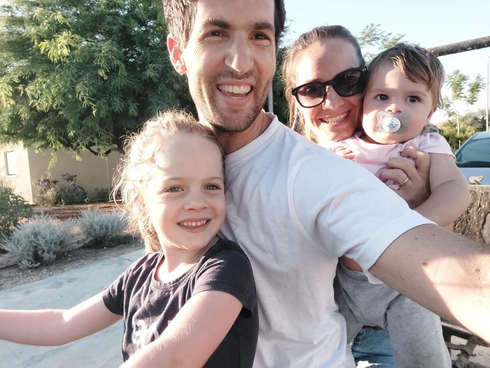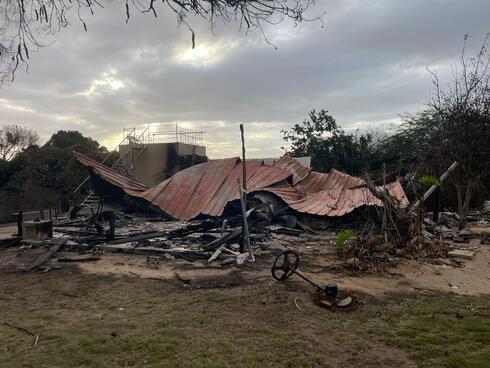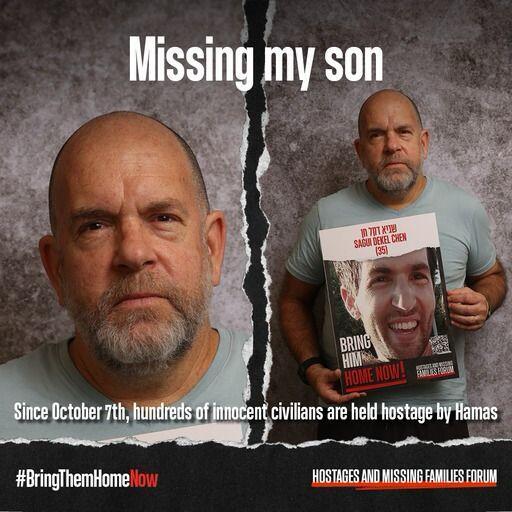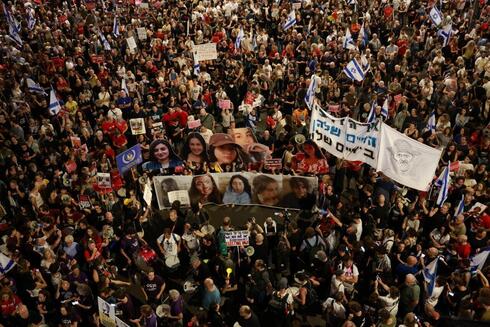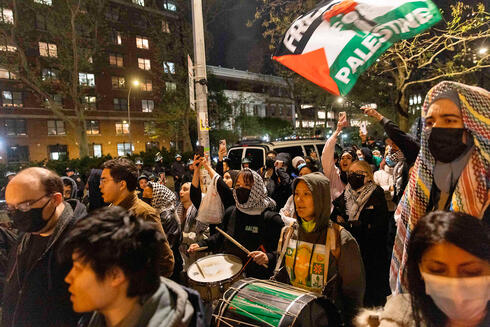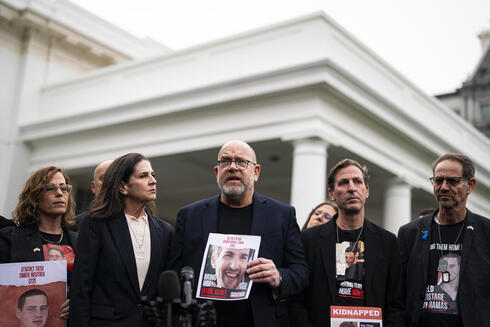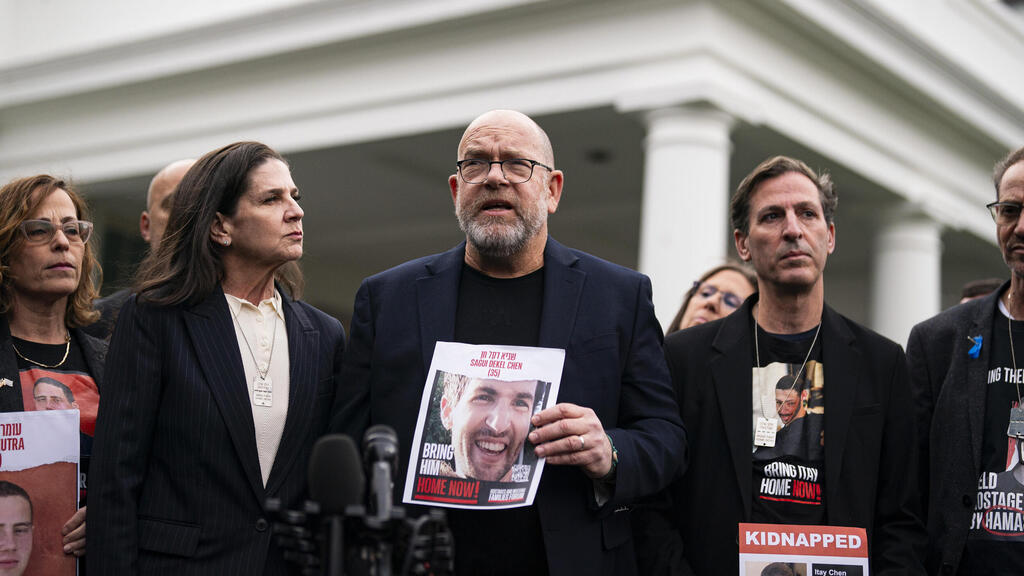
“Our government abandoned us on October 7 and before”
Jonathan Dekel-Chen is the father of U.S.-Israeli hostage Sagui Dekel-Chen, a resident of Kibbutz Nir Oz and a history professor at Hebrew University. He spoke to CTech about his son, the Israeli government’s abandonment of hostage families and how legitimate concerns about antisemitism on college campuses and elsewhere have been weaponized to deflect from the government’s responsibility for the disaster of October 7.
Early on the morning of October 7, Sagui Dekel-Chen was in his workshop on Kibbutz Nir Oz - a mile from the border with Gaza - converting four used airport buses into classrooms for underserved communities in the Negev. “He’s an extraordinary guy. A builder and a creator,” says his father, Jonathan Dekel-Chen.
Though he worked for the UK branch of the JNF, Dekel-Chen says that Sagui’s true love was converting or repurposing old buses on the kibbutz into usable objects. “He’s a kibbutz kid so he grew up knowing how to work with his hands. He made a mobile home out of his first bus, then built a mobile grocery store business going around to various communities in the south of the country.”
Sagui, 35, was among the first to report the infiltration of Hamas terrorists into the kibbutz that morning. He proceeded to alert the local security team and spent about two hours with them combating the attack. Made up of less than a dozen volunteers, the security team was never intended to combat an assault like the one they faced. “We never expected that the army wouldn’t arrive within minutes,” says Dekel-Chen.
But the army never came, never even fired a shot. They took close to an astounding eight hours - until 2:30 pm - to arrive at the besieged kibbutz, one hour after the massacre had already ended, the 200 or so terrorists from Hamas’ Nukhbah forces (meaning ‘elite’ in Arabic) had returned to Gaza, and several waves of hundreds, if not thousands, of civilian looters had traveled back and forth across the border, unencumbered, to loot and burn the kibbutz.
At about 8:30am, after two hours of fighting, Sagui went home to check on his wife Avital, seven-months pregnant, and their two young daughters. He jerry-rigged the door of their safe room where his family sheltered inside so that it couldn’t be opened externally, kissed them goodbye, and left. He is believed to have exchanged fire with Nukhbah fighters in and around their home with the last known communication with him ending at 9:30am.
His wife, Avital and their daughters, aged six and two, survived in the safe room without food or water until being extracted by the army at around 4:30pm. Two months after the attack and into his captivity, Avital and Sagui’s daughter Shahar, meaning ‘dawn’ in Hebrew, was born.
After the release of 105 hostages during the ceasefire agreement between Israel and Hamas in November, hostages from Nir Oz reported that Sagui was alive and wounded, most recently sighted in the tunnels under Khan Younnis. He is one of the 120 hostages still being held in Gaza.
Related articles:
Abandonment of hostage families
Kibbutz Nir Oz has come to symbolize the catastrophe of October 7 and the abandonment of Israel's southern residents by the state and military. Since the kibbutz was effectively conquered by Hamas for about eight hours, it sustained among the worst casualties of the day. Fifty residents were killed in scenes of extreme brutality including beheadings and rape and 40% of the buildings were burned to the ground, often with families inside, most infamously the Kedem Siman-Tov family whose children were the same ages as Sagui’s.
Seventy-eight Nir Oz residents were taken hostage, accounting for about one third of the original 240 hostages. About half of the Nir Oz hostages were released during the ceasefire agreement in November, but 36 remain, including Sagui. In total, between one-quarter to one-third of Nir Oz’s 400 residents were either taken hostage or murdered.
For Jonathan Dekel-Chen, the abandonment of his family, of Nir Oz, and of the South by the state has only been reinforced in the nine months since October 7 in the government's neglect and mistreatment of hostage families and in its failure to reach a deal to return the remaining hostages. “Our government abandoned us on October 7 and before that as well,” he says. “Until October 7th, I was a proud Israeli. Now, my world is in flames; our way of life is destroyed.”
In what has been a common criticism by hostage families, Dekel-Chen says that communication with the government has been either non-existent or negative. “The government's behavior towards the hostage families in general has been abominable.”
Sagui is one of eight remaining hostages who hold U.S. citizenship, through his father who grew up in Connecticut and moved to Israel in 1981. Dekel-Chen says that “there is no comparison” between the treatment of hostage families by the Israeli government and the approach of the U.S. government to the families of American citizens, and even those who don’t hold American citizenship, “in terms of availability, frequency of invitations, their openness, their empathy and listening to us, and occasionally running with ideas, and in efforts to get the hostages out.”
“Within two to three days after October 7, all of the families of U.S. hostages and those killed \[who had U.S. citizenship\] were contacted by American authorities. We’ve been in touch with all of them. We’ve had meetings with Jake Sullivan, the Secretary of State, the Director and Deputy Director of the CIA, and the Attorney General. We’ve had incomparable access and real conversations about the state of affairs," says Dekel-Chen.
In contrast, there has been near constant conflict between the Israeli government and the hostage families who have accused them of insufficiently communicating with and supporting them. This caused the Hostage and Missing Families Forum - the official representative of the hostage families - to align with the nation-wide protest movement several months ago in its call for new elections as the only way to achieve a new deal to release the hostages.
Of the 116 hostages who have been released, 105 were freed during the ceasefire agreement at the end of November, 2023. Only seven hostages have been freed due to rescue operations conducted by the IDF, most recently on June 8, when four hostages including Noa Argmani were rescued. After the collapse of the ceasefire agreement in December, the government was accused by hostage families of not prioritizing the return of the hostages, which many believe can only be achieved through another ceasefire agreement with Hamas.
“I was very vocal about the fact that there was a clear lack of commitment to do anything for the hostages other than to sell this myth that military action alone would get the hostages out alive,” says Dekel-Chen.
For months, Prime Minister Netanyahu has been criticized for pursuing a policy that deprioritizes returning the hostages out of political interest, since far-right cabinet ministers Bezalel Smotrich and Itamar Ben-Gvir have threatened to leave and, therefore, collapse, Netanyahu’s coalition, if any deal that leaves Hamas in power is reached.
However, in recent months, amid domestic pressure and widespread protests, international condemnation of the war, and especially U.S. pressure, the government has shifted towards pursuing efforts via mediators to revive a deal with Hamas. “Biden by his own telling had a come-to-Jesus conversation with Netanyahu which forced a change and has since leaned into the need to compromise so that a deal could be made to get hostages home,” says Dekel-Chen.
“Netanyahu has been forced to accept the fact that at some point Israel will have to say yes to a reasonable deal which will also necessitate a ceasefire, which was not the case for many months. Even if he does not admit it, it’s clear that Netanyahu has committed to this hostage deal if Hamas were to say yes. He's been put in a position where this is on the table and the world is waiting for Hamas to get to yes. But that’s different than it was two or three months ago,” he says.
Despite this change in policy, Dekel-Chen says that he is resistant to feelings of hope or optimism. “I try not to get on that roller coaster of optimism-pessimism-despair, because there’s no linear path.”
Weaponizing antisemitism
Jonathan Dekel-Chen has lived on Kibbutz Nir Oz since 1990. It’s where he raised his four children, and where he lived until October 7th. A history professor and the Chair in Soviet & East European Jewry at the Hebrew University of Jerusalem, he was with his wife in Baltimore for an academic conference on October 7 when their "lives went sideways.”
As an academic, as a hostage father, and as an American-Israeli, Dekel-Chen has a unique perspective on the widespread campus protests that have engulfed both U.S. and other Western universities, which he believes have elicited a disproportionate reaction from Israelis and the Jewish community. “Yes, there are protests on campuses and yes, they can be ugly in terms of the rhetoric, but they aren’t particularly impactful" in terms of their influence on policy today.
Ignorance rather than animus or hatred are driving the protests, he says. “Most of these students aren’t antisemitic or even anti-Zionist. Mostly, they’re ignorant about the issues. This is a cause célèbre; they may not even know where Israel and Palestine are on the map - they certainly don’t know what river and what sea they’re referring to.”
Their long-term impact, however, does worry him, adding that “these same students are going to become elected officials, judges, and if we are not able to communicate a whole lot better, when this generation comes of age and takes on leadership positions it will be concerning.”
But Dekel-Chen says that there is an unwillingness on the part of Israelis and the Jewish community to acknowledge how Israeli policies and Israel's own “ineptitude in staking out a higher moral ground over the years” has allowed this rhetoric to resonate with young people and that we are now “paying the price for the ineptitude of the Israeli government.”
When Dekel-Chen came of age, Israel was still viewed largely sympathetically across the political spectrum in the United States who saw it as a beleaguered democracy surrounded by hostile, usually much more powerful adversaries, yet pursuing peace. But this generation of students was born after the demise of Oslo, after the Second Intifada, and raised viewing Israel not as a victim or as a weaker party but as the most powerful actor in the region, with an increasingly right-wing and extremist government.
“Israel long ago lost its moral legitimacy because of its own actions and the personalities at work, and our representatives to the U.S. couldn’t be worse in terms of trying to improve Israel’s position. We have to grow up and out of this garrison mentality and be wisely engaged with the world in establishing and keeping the moral high ground. It’s the responsibility of our government to maintain it; how is it possible that in a week after October 7 Israel lost the moral high ground?” says Dekel-Chen. "‘The world is against us and ‘woe is us’ doesn’t get us very far. We could do more if our government was able or cared or understood what was going on.”
“Should we be going out of our minds right now as Israeli academics? No. We are educators - we need to educate. Our problem as Israelis and Jews is that our overreaction has become so extreme, so it doesn’t allow us to think and understand what our part in this is, and how we can organize ourselves, instead of just finger-pointing.”
Dekel-Chen says that the government has weaponized legitimate concerns about antisemitism to deflect responsibility for its incompetence in preventing the events of October 7 and their failure to return the hostages, as well as their role in supporting and bolstering Hamas. “If everyone hates us and it doesn’t matter what we do, then our leadership bears no responsibility for what happens to us. Our leadership wants Israelis and Jews worldwide to believe that everyone is against us and that the only answer is force. Nentayahu didn’t invent this, but he is the grandmaster of creating a garrison mentality."
The knowledge that antisemitism is omnipresent, he says, doesn't absolve the Israeli government of its incontrovertible failure on October 7th and every day since to uphold its most basic and essential function: to protect the Israeli people.
“There will always be antisemites; I personally experienced antisemitism before anyone heard of Hamas. It's the oldest hatred - we have to get used to it. It’s our job as Israelis and Jews to understand that such things can happen and to work accordingly to prevent them, but the work that needs to be done is not just casting blame.”
